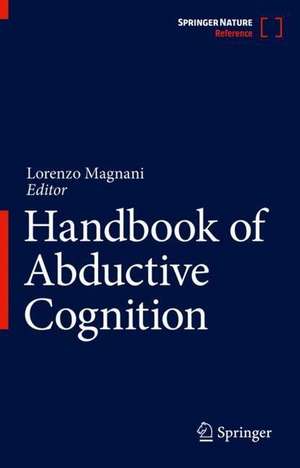Handbook of Abductive Cognition
Editat de Lorenzo Magnanien Limba Engleză Hardback – apr 2023
Preț: 3853.37 lei
Preț vechi: 4816.72 lei
-20% Nou
Puncte Express: 5780
Preț estimativ în valută:
737.57€ • 801.44$ • 619.96£
737.57€ • 801.44$ • 619.96£
Carte disponibilă
Livrare economică 31 martie-14 aprilie
Preluare comenzi: 021 569.72.76
Specificații
ISBN-13: 9783031101342
ISBN-10: 3031101340
Pagini: 1948
Ilustrații: XXXV, 1948 p. 186 illus., 56 illus. in color. In 2 volumes, not available separately.
Dimensiuni: 155 x 235 mm
Greutate: 4.11 kg
Ediția:1st ed. 2023
Editura: Springer International Publishing
Colecția Springer
Locul publicării:Cham, Switzerland
ISBN-10: 3031101340
Pagini: 1948
Ilustrații: XXXV, 1948 p. 186 illus., 56 illus. in color. In 2 volumes, not available separately.
Dimensiuni: 155 x 235 mm
Greutate: 4.11 kg
Ediția:1st ed. 2023
Editura: Springer International Publishing
Colecția Springer
Locul publicării:Cham, Switzerland
Cuprins
Philosophy and Abduction.- Theoretical and Cognitive Issues on Abduction and Scientific Inference.- The Logic of Hypothetical Reasoning, Abduction, and Models.- Abduction and Diagnosis.- Abduction in Mathematics.- Diagrams, Visual models, and Abduction.- Abduction in Cognitive Science and Neuroscience.- Abduction and Computation.- Abduction and Economics.- Abduction in Education and Human Sciences.- Abduction, Ignorance, and Creativity.- Abduction and Technological Design.- Adversarial Abduction (or Abduction and Adversariality).
Notă biografică
Lorenzo Magnani, philosopher, epistemologist, and cognitive scientist, is a professor of Philosophy of Science at the University of Pavia, Italy, and the director of its Computational Philosophy Laboratory. His primary research interests are in the area of philosophy of science, logic, and artificial intelligence. A major objective of his research has been to create a working synthesis between epistemological/historical perspectives and investigations of representations and reasoning practices carried out in the sciences of cognition. He devoted various studies in the fields of philosophy of science, logic, and cognitive science, also making specific and deep research on abductive cognition (with four monographs), science, technology, and human values, philosophy of computing, critical thinking, non-standard logics, philosophy of medicine, history and philosophy of geometry, violence, morality, and religion. His historical research centered on 19th and 20th-century geometry and philosophy of geometry. His previous positions have included: visiting researcher (Carnegie Mellon University, 1992; McGill University, 1992–93; University of Waterloo, 1993; and Georgia Institute of Technology, 1998–99) and visiting professor (visiting professor of Philosophy of Science and Theories of Ethics at Georgia Institute of Technology, 1999–2003; Weissman Distinguished Visiting Professor of Special Studies in Philosophy: Philosophy of Science at Baruch College, City University of New York, 2003). Visiting professor at the Sun Yat-sen University, Canton (Guangzhou), China from 2006 to 2012, in the event of the 50th anniversary of the re-building of the Philosophy Department of Sun Yat-sen University in 2010, an award was given to him to acknowledge his contributions to the areas of philosophy, philosophy of science, logic, and cognitive science. A Doctor Honoris Causa degree was awarded to Lorenzo Magnani by the Senate of the Ştefan cel Mare University, Suceava, Romania. In2015 Lorenzo Magnani has been appointed a member of the International Academy for the Philosophy of the Sciences (AIPS). He currently directs international research programs in the EU, USA, and China. Author of several books and articles: Non-Euclidean Geometries (in Italian, 1978); Applied Epistemology (in Italian, 1991); Introduction to Computational Philosophy (1997); Textbook of Logic: Classical Logic and Logic of Common Sense (with R. Gennari) (in Italian, 1997, reprinted in 2022), Philosophy and Geometry. Theoretical and Historical Issues (2001) his book Abduction, Reason, and Science (New York, 2001) (Chinese edition: Translated by Dachao Li and Yuan Ren, Guangdong People’s Publishing House, Guangzhou, 2006 [意] 洛伦佐·玛格纳尼 / 著;李大超,任远 / 译,《溯因、理由与科学——发现和解释的过程》,中国广州:广东人民出版社2006年) has become a well-respected work in the field of human cognition. The book Morality in a Technological World (Cambridge, 2007) develops a philosophical and cognitive theory of the relationships between ethics and technology from a naturalistic perspective. The book describes how modern technology has brought about consequences of such magnitude that old policies and ethics can no longer contain them. The book Abductive Cognition. The Epistemological and Eco-Cognitive Dimensions of Hypothetical Reasoning aims at increasing knowledge about creative and expert inferences. The study of these high-level methods of abductive cognition is situated at the crossroads of philosophy, logic, epistemology, artificial intelligence, neuroscience, cognitive psychology, animal cognition, and evolutionary theories; that is, at the heart of cognitive science. The monograph Understanding Violence. The Intertwining of Morality, Religion, and Violence: A Philosophical Stance has been published by Springer, in 2009 and 2011. A new monograph has been published by Springer in 2017, The Abductive Structure of Scientific Creativity.An Essay on the Ecology of Cognition. The recent book Eco-Cognitive Computationalism. Cognitive Domestication of Ignorant Entities, published by Springer, offers an entirely new dynamic perspective on the nature of computation. The last book Discoverability. The Urgent Need of an Ecology of Human Creativity, published by Springer in 2022, shows that discoverability is closely related to the sustainability of human creativity from an “eco-cognitive” perspective. He wrote 18 monographs, edited books in Chinese, 18 special issues of international academic journals, and 19 collective books, some of them deriving from international conferences. Editor-in-chief (with T. Bertolotti) of the Springer Handbook of Model-Based Science, 2017 and Editor-in-chief of the present Handbook of Abductive Cognition, Springer, 2023. Since 1998, initially in collaboration with Nancy J. Nersessian and Paul Thagard, he created and promoted the MBR Conferences on Model-Based Reasoning, which in 2023 is in its ninth edition. Since 2011 he is the editor of the Book Series Studies in Applied Philosophy, Epistemology and Rational Ethics (SAPERE), Springer, Heidelberg/Berlin.
Caracteristici
The first comprehensive reference guide to this interdisciplinary field Offers a logical, cognitive, epistemological, and philosophical analysis Covers hypothetical, creative, diagnostic, model-based and adversarial inferences
